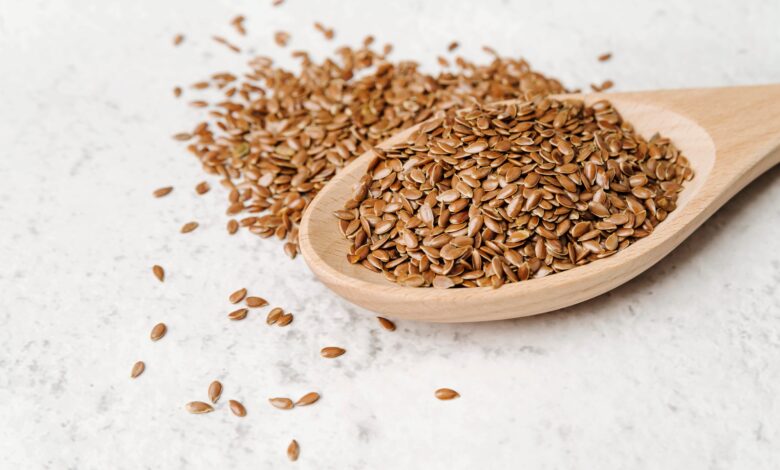
Flaxseeds, also known as linseeds, are tiny brown or golden seeds that have been consumed for thousands of years. They are a rich source of essential nutrients and have numerous health benefits. In this article, we will discuss the benefits of Flax-seeds for the body.
Nutritional value of vitamins in flaxseed:
| Vitamin | Amount Per 100g |
| Vitamin E | 0.30 mg |
| Vitamin K | 4.3 µg |
| Thiamin (B1) | 0.110 mg |
| Riboflavin (B2) | 0.055 mg |
| Niacin (B3) | 0.555 mg |
| Pantothenic acid (B5) | 0.985 mg |
| Vitamin B6 | 0.473 mg |
| Folate (B9) | 87 µg |
| Choline | 72.7 mg |
It’s worth noting that while flaxseeds do contain some essential vitamins, they are most well-known for their high levels of essential fatty acids, fiber, and minerals. In particular, Flax-seeds are a great source of alpha-linolenic acid (ALA), an omega-3 fatty acid that is essential for good health. They also contain lignans, which are antioxidants that can help protect against a range of health problems, including heart disease, cancer, and osteoporosis.
1) High in Nutrients
Flaxseeds are packed with essential nutrients, including fiber, protein, omega-3 fatty acids, lignans, and various vitamins and minerals. They are especially rich in alpha-linolenic acid (ALA), a type of omega-3 fatty acid that is essential for good health.
2) Promotes Digestive Health
Flaxseeds are an excellent source of both soluble and insoluble fiber, which can help promote healthy digestion. The soluble fiber in Flax-seeds can help regulate bowel movements, lower cholesterol levels, and improve blood sugar control. The insoluble fiber in Flax-seeds can help prevent constipation and promote regularity.
How do flax seeds protect you from diseases?
3) Supports Heart Health
Flaxseeds are beneficial for heart health because they contain high levels of omega-3 fatty acids, which can help lower blood pressure, reduce inflammation, and prevent the buildup of plaque in the arteries. They also contain lignans, which are antioxidants that can help protect against heart disease.
Top 10 Health Benefits of Oatmeal: Why You Should Add It to Your Diet
4) May Help Reduce Cancer Risk
Studies suggest that flaxseeds may help reduce the risk of certain types of cancer, including breast, prostate, and colon cancer. This may be due to the lignans in Flax-seeds, which have anti-cancer properties.
5) Supports Healthy Skin
Flaxseeds contain essential fatty acids, vitamins, and minerals that are essential for healthy skin. The omega-3 fatty acids in flaxseeds can help reduce inflammation and dryness, while the lignans in Flax-seeds can help protect against the damaging effects of UV radiation.
Flaxseeds nutritional facts and health benefits
6) May Help Manage Menopause Symptoms
Flaxseeds contain phytoestrogens, which are plant compounds that mimic the effects of estrogen in the body. This can help reduce hot flashes, night sweats, and other symptoms of menopause.
7) May Improve Brain Function
The omega-3 fatty acids in flaxseeds are essential for brain health and may help improve cognitive function. Studies suggest that consuming flaxseeds regularly may help improve memory and reduce the risk of age-related cognitive decline.

flaxseeds are a nutritional powerhouse
that can provide numerous health benefits.
They are easy to incorporate into your
diet and can be added to smoothies, oatmeal, yogurt,
and baked goods. If you’re looking to improve
your health and well-being,
consider adding Flax-seeds to your diet today.
The benefits of flaxseeds on the body
8) May Help Lower Blood Sugar Levels
Flaxseeds have been shown to help lower blood sugar levels in people with type 2 diabetes. This may be due to the high fiber content of flaxseeds, which can help regulate blood sugar levels and improve insulin sensitivity.
Benefits of black beans for the body
9) Supports Bone Health
Flaxseeds are a good source of several minerals, including magnesium, phosphorus, and calcium, which are essential for healthy bones. The lignans in flaxseeds may also help reduce the risk of osteoporosis by increasing bone density.
10) May Help Reduce Inflammation
Inflammation is a natural response to injury or infection, but chronic inflammation can lead to a range of health problems, including heart disease, cancer, and arthritis. Flaxseeds contain omega-3 fatty acids and lignans, which have anti-inflammatory properties and may help reduce inflammation in the body.
11) Supports Weight Loss
Flaxseeds are a good source of fiber and protein, both of which can help promote feelings of fullness and reduce appetite. Studies suggest that consuming flaxseeds regularly may help support weight loss and weight management.
12) May Help Improve Mood
The omega-3 fatty acids in flaxseeds may help improve mood and reduce the risk of depression. Studies suggest that consuming omega-3 fatty acids regularly may help improve symptoms of depression and anxiety.
The benefits of peas for the body
In summary, flaxseeds are a versatile and nutrient-dense food that can provide numerous health benefits. They are easy to incorporate into your diet and can be a great addition to smoothies, oatmeal, yogurt, and baked goods. Whether you’re looking to support heart health, improve digestion, or manage your weight, adding Flax-seeds to your diet can be a great way to boost your overall health and well-being.



